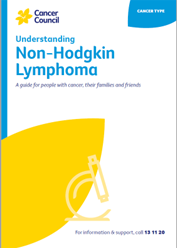- Home
- Non-Hodgkin lymphoma
- Diagnosis
- Lymph node biopsy
Lymph node biopsy
Removing some cells and tissue from an enlarged lymph node is the only way to find out why it’s swollen. This is called a biopsy and it may be done as either an excision biopsy or a core biopsy.
Learn more about:
The different types of biopsy
Excision biopsy |
Core needle biopsy |
|
|
After the biopsy
The biopsy sample is sent to a laboratory for examination under a microscope by a specialist doctor called a pathologist. The results will usually be ready in 7–10 days. This waiting period can be an anxious time and it may help to talk to a supportive friend, relative or health professional about how you are feeling.
If the pathologist finds lymphoma cells, they can tell which type they are with further tests on the biopsy sample. These tests may include:
Immunophenotyping – This test looks for differences between types of cells. It does this by identifying markers called antigens, which are found on the surface of cells. Looking at the patterns of antigens can help your doctor work out what subtype of non-Hodgkin lymphoma you have.
Genetic tests (cytogenetic and molecular tests) – Cancer changes the genes of affected cells. These gene changes are not the same as genes passed through families. The fault is only in the lymphoma cells. Having tests to look for changes in the genes involved in lymphoma is becoming more common.
The results of these genetic tests help doctors recommend the most suitable treatment options. The results also help work out the chance of the non-Hodgkin lymphoma coming back (relapsing) after a period of improvement (remission).
One of the main tests used to look for common gene changes in certain types of non-Hodgkin lymphoma is FISH (fluorescence in situ hybridisation). This test uses special dyes to look for abnormal chromosomes in the biopsy sample.
→ READ MORE: Further tests for non-Hodgkin lymphoma
Podcast: Tests and Cancer
Listen to more of our podcast for people affected by cancer
More resources
Dr Puja Bhattacharyya, Haematology Staff Specialist, Western Sydney Local Health District, Blacktown Hospital; A/Prof Christina Brown, Haematologist, Royal Prince Alfred Hospital and The University of Sydney; Dr Susan Carroll, Senior Staff Specialist, Radiation Oncology, Royal North Shore Hospital and The University of Sydney; Jo Cryer, Clinical Nurse Consultant, Haematology, St George Hospital; Marie Marr, Consumer; Katelin Mayer, Clinical Nurse Consultant, Cancer Outreach Team, Nelune Comprehensive Cancer Centre, Sydney; Vanessa Saunders, 13 11 20 Consultant, Cancer Council NSW; Elise Toyer, Haematology Clinical Nurse Consultant, Blacktown Hospital.
View the Cancer Council NSW editorial policy.
View all publications or call 13 11 20 for free printed copies.

